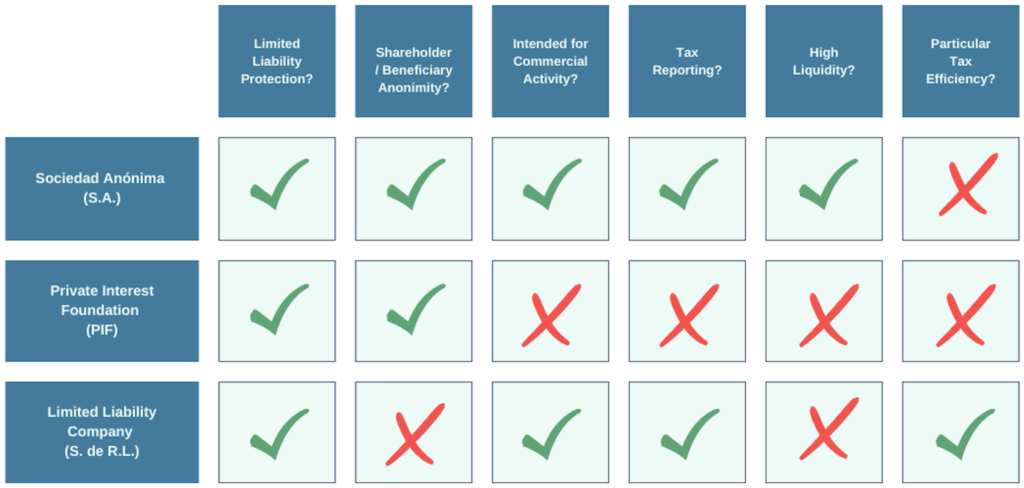If you are doing any business or investing in Panama, at some point you’ll probably consider setting up a corporation. A lot of people aren´t sure whether they should incorporate, and they may be uncertain whether to set up an S.A. or some other type of corporate entity. This article will give an overview of 3 popular types of corporate entities in Panama.
Why Incorporate in Panama?
People create corporate entities for a variety of reasons.:
- Separation of Personal and Business Affairs
When someone starts a new business, a corporation facilitates the creation of a legal identity and build a fresh brand around the business venture. It can also make it easier to manage finances and keep track of business expenses. - Personal Liability Protection
A corporation is a separate legal entity that can be held responsible for its debts and obligations. So if a business runs into financial trouble, the company´s shareholders will not be held personally liable for the company’s debts or obligations. - Asset Protection Planning
People also set up corporations to limit extraneous liabilities that might otherwise affect their investments. If a shareholder were to be sued or subject to some type of significant liability on a personal level, it is unlikely that any assets held in a corporation would be at risk.
Read more about using corporate entities to limit liability. - Tax Planning
People may also set up corporate entities as part of a strategy to minimize taxes or to be more strategic and precise in balancing income against expenses. - Transferability
Some investments will be best suited to holding structures that allow for the easy and quick transfer of assets, while others may be better suited to a legal structure that facilitates the passing on of assets to heirs. - Partnerships
Corporations allow for ownership to be divided between multiple persons. And many people also incorporate to form partnerships in a business or investment.
Incorporating in Panama is relatively straightforward and inexpensive, and the process usually takes just a few days.
What do we mean by “Corporation”?
This article covers 3 different kinds of corporate entities:
- the Sociedad Anónima (the “S.A.”);
- the Private Interest Foundation (“PIF“); and
- the limited liability society (the “S. de R.L.”).
Let’s take a look at the main differences between them.
The Sociedad Anónima (“S.A.”)
Similar to a C-Corp in the United States or a Private Corp in Canada, the S.A. shields assets from claims of creditors against its shareholders. The S.A. also offers protection to the shareholder(s) from liabilities affecting the asset or the company. But this type of corporate entity also goes a step further in the sense that it also provides shareholders anonymity. The ownership is entirely private and is not listed anywhere in Panama as a matter of public record.
One of the biggest advantages of forming an S.A. in Panama is the flexibility it provides. The S.A. can be established with just one shareholder or its shares can be distributed across multiple shareholders. Also, the shares of an S.A. are very easily transferred from one person to another, which makes the S.A. extremely liquid. The S.A. can be used for commercial activity such as an ongoing business operation, but it is also frequently used to hold assets (real estate, vehicles, etc).
If the S.A. maintains generates income here in Panama, then it should file a tax declaration. The applicable tax rate is generally 25%, and then there is typically a 10% withholding tax on dividends to shareholders.
Read more about the benefits of using the shares of an S.A. corporation to transfer real estate.
The Private Interest Foundation (“PIF”)
The PIF is arguably not a “corporation”; rather, it is a foundation. But I include it here because this type of entity is also quite popular in Panama for some of the same reasons as an S.A. or an S. de R.L. entity. A PIF does not have shareholders. Rather, it has a founder (or several founders) and a beneficiary (or multiple beneficiaries). A founder can also be a beneficiary of the PIF, but beneficiaries’ identities are entirely private (just like the shareholders of an S.A.).
A PIF also offers liability protection for the founder and the beneficiaries from liabilities affecting the assets and the entity. A PIF’s assets would also generally be shielded from a creditor claim against the founder and any of the beneficiaries. So, the PIF also works as a part of an asset protection strategy.
The PIF generally does not need to submit a tax declaration, because the PIF is not intended to be used for commercial activity. Rather, it is intended to hold assets intended to serve the benefit of the PIF itself.
The PIF is governed by an internal set of by-laws (the “reglamento“), which acts as a sort of living will in case something happens to the primary beneficiaries. This allows the primary beneficiaries of the PIF to pass their assets on to their heirs while avoiding a lengthy probate process. This is why the PIF is often used in estate or succession planning.
The Limited Liability Society (“S. de R.L.”)
This type of corporation is analogous to a Limited Liability Company (LLC) in the United States.
An S. de R.L. also limits liabilities between the entity, its assets, and its owners, which in this case are referred to as “members” or “partners”. However, the identity of the owners of an S. de R.L. is publicly available for anyone who wants to look, so the S. de R.L. does not offer the anonymity of the S.A.
Also, you need at least 2 people to create an S. de R.L. And there is an upward limit of 50 partners (or members) in an S. de R.L.
The ownership of an S. de R.L. typically can only be transferred with the permission of the other partners. So the S. de R.L. is not as liquid as the shares of an S.A.
If the S. de R.L. is doing business in Panama, then it should file a tax declaration (like the S.A.). The tax rate is 25%. But unlike the S.A. there is no double taxation (i.e. no 10% withholding tax on distributions of dividends).
Which Corporation Should You Choose?
Well, first there is the question of whether you should incorporate at all.
Any corporate entity involves expenses and legal fees to set up, as well as ongoing annual costs to maintain. If you are starting a small business venture or investing in a real estate property as a primary residence, then consider whether the added benefit justifies the upfront and ongoing cost of incorporating.
But if you do incorporate, then choosing the right type of corporation depends on your circumstances and objectives.
- Operational Business or Business Assets
The S.A. or the S. de R.L. can both be good options for business owners. Both are subject to a 25% income tax rate, but the S. de R.L. allows the owners to avoid double taxation. And both are exempt from taxes on foreign-sourced income. - Anonymity vs. Transparency
The S.A. and the PIF both offer anonymity, which is important for some people and provides an additional layer of protection for the shareholders. However, if you plan to use your corporation to engage in international business or to raise institutional money, then you may prefer the transparency of the S. de R.L. - Upfront and Ongoing Costs
The cost of creating and maintaining an S.A. and an S. de R.L. are approximately the same, but a PIF is a bit more expensive to set up. The annual costs of maintaining a PIF are also slightly higher than the S.A. or the S. de R.L. and both are exempt from taxes on foreign-sourced income. - Liquidity
However, if you want to bring new equity partners or eventually sell some or all of the ownership of the company and its assets, then the S.A. offers more liquidity than the S. de R.L. and the PIF.
And because the S.A. is so liquid, it can sometimes also allow for the transfer of real property in a way that may sometimes afford the buyer some significant ongoing property tax savings. It’s completely legal, and you can read about it here. - Estate and Succession Planning
If you are most concerned about how to easily transfer your assets to your heirs one day, then the PIF is worth considering. This is because the by-laws serve as sort of a will, which allows your heirs to avoid a lengthy probate process. Actually, the best scenario would be to hold the assets in liquid S.A. entities underneath the PIF, so that they can be transferred to your heirs quickly and easily.
Here is a quick cheat sheet that compares the 3 corporate entity types we have seen today:

Bottom Line?
Incorporating allows my clients to form partnerships around business ventures and investments, while also minimizing their taxes and creating limited liability protections for themselves and their assets. But you´ll need to decide which type of corporation to create.
The sociedad anónima (S.A.), the private interest foundation (PIF) and limited liability society (S. de R.L.) are 3 popular corporate entity types that my clients consider. Each is different in a few very fundamental ways. And while incorporating can be a good idea, I always invite my clients to run a quick cost-benefit analysis before pulling the trigger.
And if you´d like to do a deeper dive into how these different types of entities can be mixed and matched for asset protection, then be sure to read our article, Asset Protection: What is the Best Holding Structure?
If you are considering setting up a corporation in Panama, then I can help you choose the best structure based on your plans. You can write to me here!







